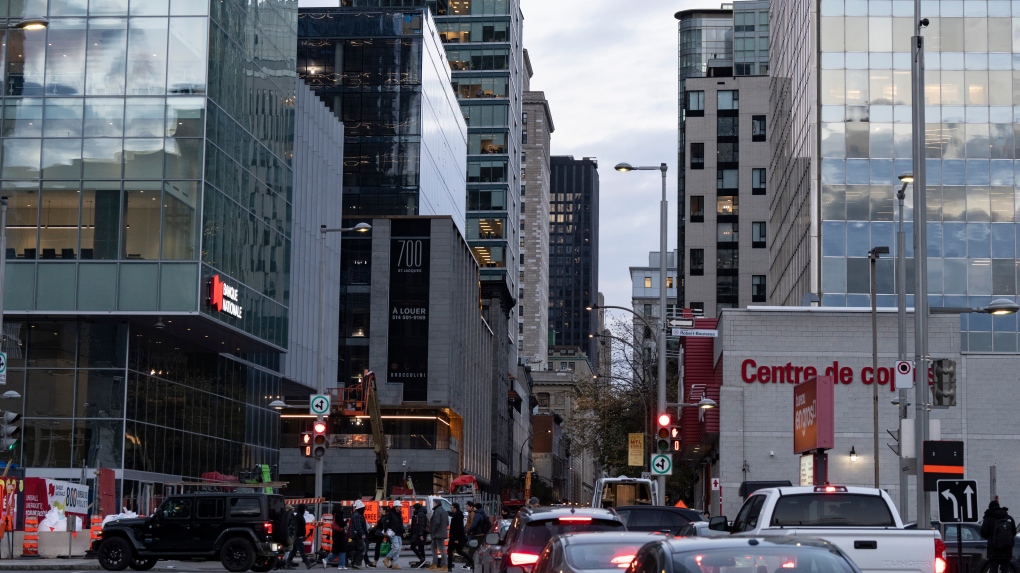Quebec has the highest number of barriers to trade between provinces: economic institute
 Downtown Montreal on Thursday, Nov. 2, 2023. THE CANADIAN PRESS/Christinne Muschi
Downtown Montreal on Thursday, Nov. 2, 2023. THE CANADIAN PRESS/Christinne Muschi
Quebec is the province that imposes the most barriers to interprovincial trade, according to a report from the Montreal Economic Institute (MEI) which says that this protectionism harms the Quebec economy.
MEI public policy analyst Gabriel Giguere said barriers to internal trade are not the most publicized issue, but they have a significant economic effect on Canada.
"The elimination of these barriers makes it possible to increase productivity, and that is an important thing for the standard of living of Canadians," he said.
Trade barriers between provinces push the price of goods and services up by 7 per cent, according to a study published in 2017 by Statistics Canada.
Giguere cites recent studies, which estimate that the annual gross domestic product (GDP) in the long-term could increase by between $110 billion and $200 billion if barriers between provinces were abolished.
The MEI lists 35 Quebec exceptions to the Canadian Free Trade Agreement, a number which has not changed since 2017.
"There are some barriers which are much too broad," said Giguere.
The analyst gives as an example the restrictions affecting the forestry sector. All wood harvested from provincial forests, including biomass, must be entirely manufactured in Quebec.
He also said that Quebecers would benefit from a more diversified offer if they could purchase alcohol from suppliers in other provinces.
"Although it has been possible since 2022 to go to another province and bring alcohol back, it is a little complicated," he said. "When you want a specific wine from the Okanagan Valley (in British Columbia), you would have to take a plane to pick it up, whereas it is not possible to have it delivered to your home."
Quebec is in the middle of the pack when it comes to labour mobility. The province has four exceptions to the Canadian Free Trade Agreement that relate to labour mobility.
Giguere questions the relevance of restrictions on the mobility of professionals between provinces.
"I don't understand why, in Quebec, it is not possible for a dentist from certain provinces to practice here. The patient is no different. We all have similar mouths," he said.
In a labour shortage context, he said these constraints do not help Quebec.
"When Quebec has a barrier, it is a barrier to entry, it is not a barrier to exit. So, it is possible for a person, a paramedic (ambulance) for example, to go and work elsewhere. It is Quebec that is restricted from a potential pool of workers," said Giguere.
This report by The Canadian Press was first published in French on Nov. 30, 2023.
CTVNews.ca Top Stories

BREAKING Toronto MP and former Liberal cabinet minister Marco Mendicino won't seek re-election
Marco Mendicino, a prominent Toronto member of Parliament and former minister of public safety and immigration, won't run in the next federal election, CTV News has learned.
U.S. soldier shot self in head before Cybertruck exploded outside Trump's Las Vegas hotel, officials say
The highly decorated U.S. Army soldier inside the Tesla Cybertruck that burst into flames outside U.S. President-elect Donald Trump's Las Vegas hotel shot himself in the head before the explosion, officials said Thursday.
Toys "R" Us Canada closing 5 stores, expand HMV and add play spaces to some shops
Toys "R" Us Canada says it is closing five Ontario stores and revamping several others as it works to "optimize" its business.
Possible scenarios that could play out in Ottawa as the Liberal government teeters
Prime Minister Justin Trudeau is said to be reflecting on his future over the holidays after the resignation of his top cabinet minister, Chrystia Freeland, in mid-December. The bombshell move prompted a fresh wave of calls for Trudeau to step down as Liberal leader from inside and outside the caucus.
FORECAST Weather warnings issued in 7 provinces and territories
Wintry weather conditions, including heavy snow and wind chill values around -55, prompted warnings in seven provinces and territories Thursday.
When you should see a doctor and other health advice, according to a nurse
As many begin the new year with health resolutions, here's one nurse's advice on when to see the doctor, get tests and seek preventative care.
Apple to pay US$95M to settle lawsuit accusing Siri of snoopy eavesdropping
Apple has agreed to pay US$95 million to settle a lawsuit accusing the privacy-minded company of deploying its virtual assistant Siri to eavesdrop on people using its iPhone and other trendy devices.
Calgary army reservist and museum curator killed while ice climbing in B.C.
A Calgary army reserve officer was killed in an ice-climbing accident in eastern British Columbia over the holidays.
Woman, father killed on New Year's Eve were victims of intimate partner violence: Halifax police
Halifax police are investigating three deaths that are connected – two of which they say were homicides resulting from intimate partner violence – in the city on New Year’s Eve.


































